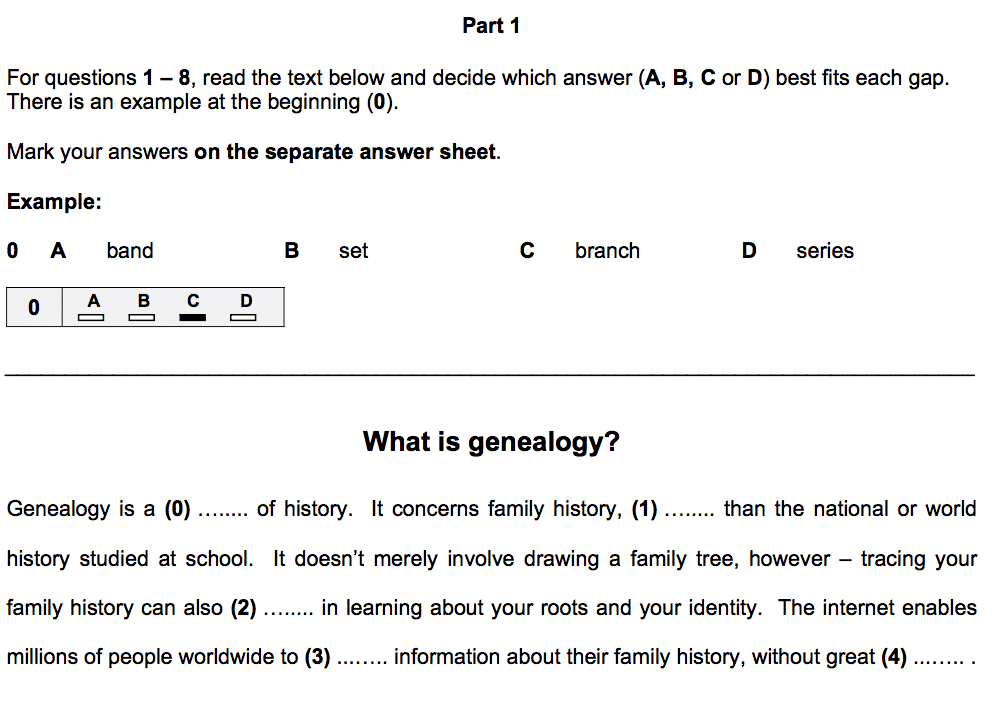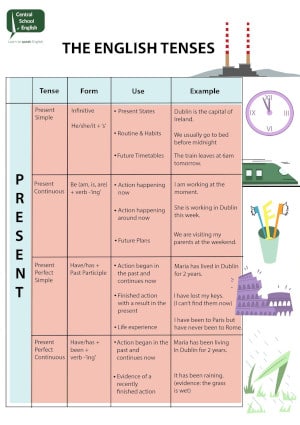FCE Exam Class – Reading and Use of English: Part 1

This FCE Class looks at the first part of the Reading and Use of English Paper in the Cambridge First (B2) Exam, what it tests, how to approach it and how to revise for it.
The first test in the Reading and Use of English Paper of the FCE Exam looks something like this:

(The actual test paper is longer with 8 gaps for you to fill.)
What the test involves
Your task is to choose, from the four possible answers given, the best word to fill the gap.
Time you should spend on this test.
Approximately 10 minutes.
What’s being tested
This is a test of your familiarity with English vocabulary, and often tests your knowledge of collocations (words that are often seen/heard together in English).
How to do the test
1. Read the title
This will give you a general sense of what the piece is about. Good to know.
2. Skim through the text
Before attempting to choose answers, quickly read through the text to understand what the piece says. This will help you find the answers.
3. Work through the text from the top
Choose the word that you think is best as you go. The first gap (Numbered ‘0’) is an example. Don’t waste time trying to work out why the answer is correct, but read the sentence and move on to Number 1, then 2 and so on to the end.
If you are not sure of an answer, but have a good guess, put that in. If you really don’t know, leave it blank and move on to the next. You can come back to these when you’ve done the others and again after you finish other parts of the exam. The point is to not get ‘bogged down’ (*see bottom of page for meaning) trying to figure out one answer. Better to use your time getting the one’s right that you can. This is a more efficient use of your time.
4. Go through the text once again
Complete any answers you missed and check the answers that you have already put in. Are you happy with them? Again, if you are stuck on one answer, don’t get too ‘bogged down’ on it. It is more important to move on to the next part of the exam where there are more points to be scored. You can always come back to this test at the end of the exam if you have time.
Answering the questions
Read through the whole sentence, paying particular attention to the words on either side of the gap. Look at the possible answers. If there is an obvious answer put it in. If you need to think some more, think about these things:
- There may only be a small difference in meaning between the possible answers. What is the difference?
- Is there a preposition following a gap which will be filled by a verb? – which verb uses that preposition?
- Read the whole sentence with the word that you think is likely. Does it sound right? Then it probably is.
Scoring
You will get one mark for each correct answer.
Learn to SPEAK English
Join a live online English tutor to get help with your English or study at our school in Dublin, Ireland.
Individual and group classes with our expert teachers.
General English | FCE Exam Preparation | CAE Exam Preparation
FCE Exam Class: Reading and Use of English Part 1 – An Example

Let’s have a look at the sample test above.
The first sentence within which we have to place a word reads: “It concerns family history, _______ than the national or world history studied at school.”
We must choose from:
- A: instead
- B: rather
- C: except
- D: sooner
Notice the preposition ‘than’ which follows the gap. Do we say ‘instead than’? No, we ‘instead of‘. Do we say ‘rather than’? Yes, perhaps B is right. Do we say ‘except than’? No, we say ‘except from’ or ‘except for’. Do we say ‘sooner than’? Yes, D is also a possibility.
Now lets take a look at the meaning. The sentence is contrasting the ideas of ‘family history’ and ‘national or world history’ and telling us Genealogy is about (it concerns) the first and not the second. The sentence is saying these two things are different from each other. We know that when we say ‘rather than’ we mean ‘as an alternative to’, in other words, a different thing. ‘Sooner than’ means ‘before’ Are we saying family history should come before national or world history. No, so D is not correct.
The answer is B: rather.
The second sentence reads: “…tracing your family history can also ______ in your learning about your roots and your identity.”
We must choose from:
- A: cause
- B: mean
- C: result
- D: lead
Again, notice the preposition ‘in’ which comes after the gap. The verbs given, cause, mean, result and lead can all be used to mean much the same thing but which prepositions follow these verbs?
Do we say ’cause in’ something? No, ’cause’ doesn’t use a preposition; we simply say ’cause something’.
Do we say ‘mean in’ something? No, ‘mean’ doesn’t use a preposition; we simply say ‘mean something’.
Do we say ‘result in’ something? Yes. ‘result’ uses the preposition ‘in’.
Do we say ‘lead in’ something? No, we say ‘lead to‘; ‘lead’ uses the preposition ‘to’.
The answer is C: result.
The third sentence reads: “The internet enables millions of people worldwide to ______ information.”
We must choose from:
- A: accomplish
- B: access
- C: approach
- D: admit
This question is testing to see if you know the difference in meaning between these verbs.
‘Accomplish’ means to finish something successfully or achieve something. We can accomplish a task, but can we accomplish information. No.
‘Access’, as a verb, means to get to (or inside) something. Can we ‘get to’ information on the internet? Yes.
‘Approach’ means to get nearer to someone or something. Is the sentence here talking about ‘getting near’ to information by using the internet? No, we it is talking about actually arriving at the information.
‘Admit’ can mean to allow someone in a place, for example. ‘A ticket admits you to the cinema.’ Is the sentence talking about allowing information in somewhere?. No, it is talking about allowing people to get to the information. (‘Admit’ can also mean something similar to confess, for example:“he admitted to breaking the window” but such an idea makes no in this sentence.)
The answer is B: access.
What is the best way to revise for this test?
Because this is a test of your range and understanding of vocabulary and how words in English work together, the best way to prepare yourself for this test is simply to read and/or listen to as much good quality English as you can. Choose something you like… books, newspapers, websites about your interests, podcasts, TED talks, whatever… and get stuck in. Look up words you see or hear and don’t know in a good dictionary or online.
More practice
The above sample paper is taken from the official Cambridge English website from where you can download the whole test or complete it online. Download this test by clicking on ‘Download sample paper 1 for B2 First’ or on ‘Reading and Use of English Sample Test’ to do the test online.
Happy studying!
*’bogged down‘ is a phrasal verb – or you could describe it as an idiomatic expression. When we say someone is ‘bogged down in something’ we mean they are spending too much time struggling with something they find difficult. The expression is derived from the fact that a bog is a wet, muddy piece of land that is difficult to walk through.

Speaking Part 1 of the Cambridge FCE Exam tests your ability to talk socially about yourself… So, you’re thinking of

Read the task The first thing to do is to study the task input. There are also four questions you

The Writing exam lasts for an hour and twenty minutes (80 minutes). There are two parts to the Writing exam


